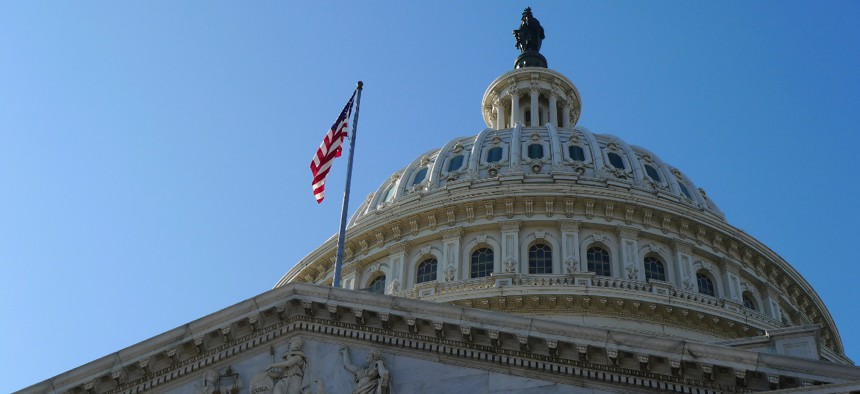
Schedule F — created by a Trump-era executive order — established a new job category outside of the competitive service and required agencies to convert federal workers in “policy-related” positions into the new classification, making them effectively at-will employees. Mint Images/Getty Images
Lawmakers Left Anti-Schedule F Legislation Out of the Compromise Defense Policy Bill
Prospects for it look grim after it wasn’t included in the piece of must-pass legislation.
Congressional negotiators on Tuesday night finally revealed a compromise version of the annual defense policy bill with the aim of passing it through both the House and Senate this week. But to some lawmakers, federal employee groups and good government experts’ chagrin, the measure did not include a provision aimed at blocking Republican-led efforts to strip potentially tens of thousands of federal employees of their civil service protections.
In the waning months of the Trump administration, then-President Trump signed an executive order establishing a new job category outside of the competitive service called Schedule F and requiring agencies to convert federal workers in “policy-related” positions into the new classification, making them effectively at-will employees.
Although no employees ultimately were reclassified before President Biden assumed office and rescinded the order, reporting over the summer indicated that conservative Republicans are eager to reinstitute Schedule F, with some former Trump officials going so far as to identify up to 50,000 federal employees to immediately reclassify upon the election of the next Republican president and threaten them with firing.
Since then, Democrats in Congress have redoubled efforts to pass the Preventing a Patronage System Act (H.R. 302), which would block the president from reimplementing Schedule F or any new excepted schedule category of workers without advanced congressional approval. The House passed the measure both as a standalone bill and as part of its initial version of the fiscal 2023 National Defense Authorization Act, and Sens. Tim Kaine, D-Va., and Dianne Feinstein, D-Calif., pushed for the measure’s inclusion in the Senate version of the legislation.
The fact that the legislation ultimately was not included in the final bill was a bitter disappointment to Donald Moynihan, the McCourt Chair at Georgetown University’s McCourt School of Public Policy.
“It seems like an incredible missed opportunity to address this potentially catastrophic threat to the civil service, and the likelihood is that nothing will get passed as long as Republicans hold the House,” Moynihan said. “So, the lame duck session felt like the last train in town to get something done.”
Kaine told Government Executive last month that he was confident he could get a vote for the bill on the Senate floor either as part of the NDAA or the omnibus spending package. But with negotiations over the latter seemingly in limbo, as House Republicans urge their colleagues to hold out until the new Congress when they will have more leverage, Kaine was less committal Wednesday.
“While my push to protect our civil service—which is invaluable to our national security—didn’t make it into this year’s annual defense bill, I will keep working to get this legislation across the finish line as soon as possible,” Kaine said in a statement.
Don Kettl, professor emeritus at the University of Maryland and a former dean of its School of Public Policy, said that Democrats simply haven’t made protecting the federal merit system a big enough priority to warrant fighting for its inclusion in must-pass bills thus far.
"The Democrats have been focused for the most part not on the operations of government but larger policy issues, which is part of a broader battle in both symbols and ideology," he said. "The Democrats in general simply have not paid as much attention to government’s internal management functions as perhaps the Republicans have, and among the things that could been done, it’s fairly low in the list of priorities.”
But ultimately, Kettl said that the legislation blocking Schedule F could be easily tossed aside in a scenario where Republicans regain control of the White House and one or both chambers of Congress.
“On the one hand, I’ve been a strong supporter of putting into law an effort to reinforce the merit system, but prohibitions that say, ‘Thou shalt not engage in Schedule F behaviors or undermine the system,’ those efforts are potentially worthless, because it’s put into law, it can easily be taken back out again [such as in a future NDAA],” he said. “It’s important to try to make that point and to underline that effort. However, I do think that it’s something that can be undone with a stroke of a pen or a quick amendment, so practically speaking it doesn’t provide that much protection.”
Moynihan suggested that the failure to galvanize Democratic support behind a bill to protect the civil service may have been at least in part because of Schedule F’s association with Trump specifically, rather than a larger coalition of conservative activists and elected officials. He noted that one of the other Republican presidential front runners, Florida Gov. Ron DeSantis, has engineered the ouster of elected local prosecutors and school board members unwilling to implement his policies.
“I think there’s a potential here that people think that if Trump is out of the running in 2024 or if he loses steam in the primaries, then the threat will disappear with him, and I think that’s incorrect,” he said. “While Trump was the one who originally signed it, any Republican nominee from the current party will be inclined to use it, and us it maybe in slightly different ways . . . The rhetoric from much of the party centers on the administrative state as a threat to American values, so it would be surprising if any Republican didn’t take advantage of a tool that allowed them to respond to that rhetoric.”







